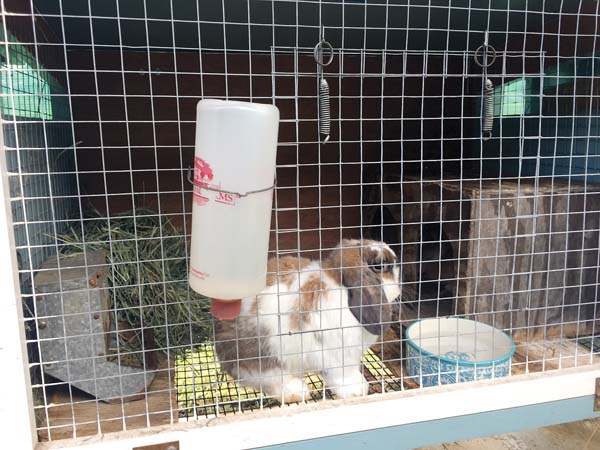In June of 2022, the Hawaiʻi Department of Agriculture (HDOA) alerted the public that tissues submitted by a practicing Maui Veterinarian tested positive for Rabbit Hemorrhagic Disease. The owner had a farm in Kula, and HDOA determined that nine of the twelve of their rabbits had died fairly suddenly without showing significant prior signs of illness. Only recently found in the United States, RHDV2 is a virus found in hares and rabbits that causes internal bleeding and death. The Maui detection marked the first known case of this disease in Hawaii.
A New Mexico-based wildlife biologist encountered wild rabbit carcasses in 2018 while walking his dog in the desert. He sent samples the U.S. Department of Agriculture confirmed as the country’s first case of rabbit hemorrhagic disease (RHDV2). The virus later caused outbreaks in 2020 for both wild and domesticated rabbits throughout 19 states. In response, HDOA ramped up biosecurity efforts to prevent infected rabbits from arriving to our islands.

Dr. Jason Moniz is the Veterinarian Program Manager with HDOA’s Animal Industry Division, Animal Disease Control Branch. “Since the 2020 outbreak of RHDV2, importers of rabbits are required to have a veterinarian examine and issue a Certificate of Veterinary Inspection within 72 hours before departure to ensure that they are healthy and have not been exposed to RHDV2. ” Upon arrival in Hawaii, inspectors check the animal again before releasing it to the owner. Finally, owners are required to quarantine the rabbit for 30-days before introducing it to other rabbits. Inspectors do follow-up calls with imports seven days after arrival to ensure the rabbits remain healthy. This strict process also provides HDOA with records on 100% of the rabbits that come into Hawaii. If there is a disease outbreak, they have the records to trace the potential origin.
With this recent case, HDOA couldn’t find a link between any introduced rabbits and those on the Kula farm. “It’s like this dropped out of the sky,” Dr. Moniz stated. However, he has suspicions about how the virus may have arrived. “RHDV2 is an incredibly hardy virus, able to survive not only on rabbits, people, and inanimate objects for up to three months.” he explains. Even wearing an unwashed piece of clothing after coming in contact with sick rabbits could trigger an outbreak months later if it comes into contact with healthy ones. Dr. Moniz also has concerns about the potential for feed to be contaminated if harvested from areas where RHDV2 is present.
Good sanitation and biosecurity practices are essential for protecting rabbits, and the same general practices apply when introducing any new animal (or plant) to protect Hawaii from new invasive pests. HDOA recommends the following:
- Keep new rabbits and other animals separated for at least 30 days. Dogs, cats and other imported animals are not at risk for RHVD2, but the virus can hitchhike on their fur and spread to healthy rabbits.
- Sanitize all equipment and cages used for rabbits with 10% bleach or 10% sodium hydroxide mixed with water.
- Do not allow visitors in rabbitries or let them handle pet rabbits without clean, protective clothing. If a visitor was recently in a state that has an outbreak of RHVD2, ensure they decontaminate any items they traveled with before coming into contact with your rabbit.
- Always wash hands with warm soapy water before and after entering your rabbit area.
There are currently no wild rabbit populations in the state. If there were, a disease like RHDV2 would be impossible to eradicate. Additionally, wild rabbits can cause environmental damage. In the early 1900s, wild rabbits on Kauo (Laysan) island ate all the vegetation, causing the extinction of native seabirds that lost their habitat. Hawaii state law requires pet owners to contain their rabbits above ground under penalty of fines, loss of the pet, or even imprisonment. Rabbits, well, breed like rabbits; spay or neuter them in case of accidental escape.
Owners or veterinarians experiencing unusual losses of rabbits should contact the HDOA’s Animal Industry Division at (808) 483-7100 or (808) 837-8092.
Report rabbits in wild areas to MISC at (808) 573-6472.
Learn more about rabbit hemorrhagic disease here: https://www.aphis.usda.gov/publications/animal_health/fs-rhdv2.pdf
Serena Fukushima is the public relations and education specialist for the Maui Invasive Species Committee. She holds a bachelor’s degree in environmental studies and a graduate degree in education from the University of Hawaii at Manoa. “Kia’i Moku, Guarding the Island” is written by the Maui Invasive Species Committee to provide information on protecting the island from invasive plants and animals that threaten our islands’ environment, economy and quality of life.
This article was originally published in the Maui News on July 9, 2022 as part of the Kia‘i Moku Column from the Maui Invasive Species Committee.
Read more Kiaʻi Moku articles
